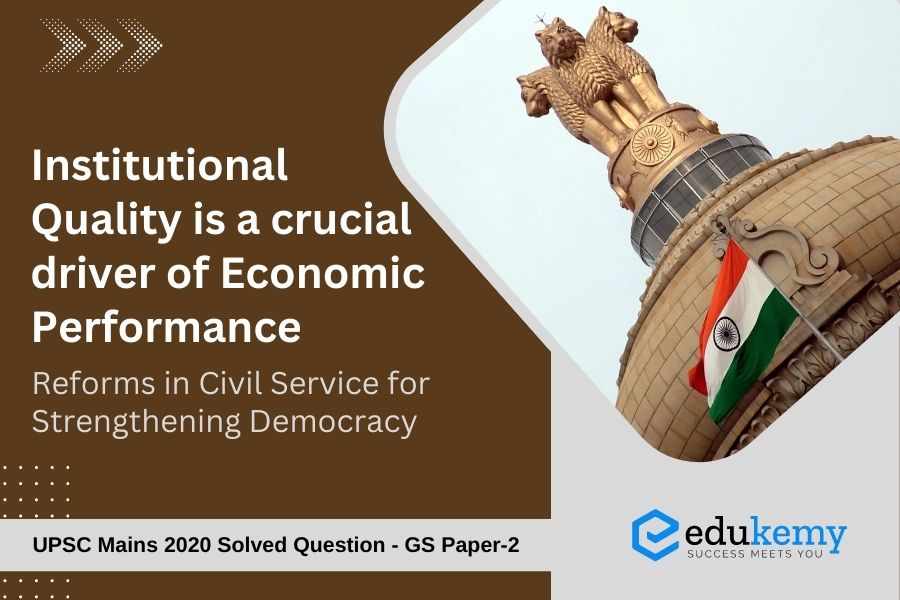Institutional quality, characterized by the efficiency, transparency, and accountability of public institutions, plays a pivotal role in shaping a nation’s economic performance. The Civil Service, as a key component of these institutions, holds significant influence in the governance and functioning of a democratic society. To strengthen democracy and enhance economic performance, reforms in the Civil Service are imperative. Firstly, there should be a focus on merit-based recruitment and promotions, ensuring that individuals are appointed based on their qualifications and capabilities rather than political affiliations. Transparent and performance-oriented evaluation mechanisms should be implemented to foster a culture of accountability and efficiency within the Civil Service. Additionally, investing in continuous training and professional development programs for civil servants will equip them with the necessary skills to adapt to evolving challenges. Furthermore, promoting diversity and inclusivity within the Civil Service can contribute to a more comprehensive and representative decision-making process. By instituting these reforms, the Civil Service can become a robust pillar supporting the democratic framework, ultimately leading to improved economic performance and sustainable development.
UPSC Mains General Studies Paper – 2 Mains 2020
Role of civil services in a Democracy
UPSC Mains Civil Services IAS Exam Question Paper – 2020
Contents
- 1 Structure of the Question
- 2 Answer
- 3 Conclusion
- 4 Frequently Asked Questions (FAQs)
- 4.1 Q: Why is institutional quality considered a crucial driver of economic performance?
- 4.2 Q: How does the quality of Civil Service impact institutional strength and, consequently, economic performance?
- 4.3 Q: What specific reforms can be implemented in the Civil Service to strengthen democracy?
- 4.4 Q: How can Civil Service reforms promote inclusivity and citizen engagement in decision-making processes?
- 4.5 Q: Are there international examples where successful Civil Service reforms have positively impacted economic performance and democracy?
Structure of the Question
- In Introduction,
- About Institutional Quality with a focus on Civil Services as an institution.
- In Body,
- Challenges faced by Civil Services in India.
- Reforms to overcome the challenges to Civil Services.
- In Conclusion, the mission of the government in this direction.
Answer
Introduction
“If liberty and equality, as is thought by some, are chiefly to be found in democracy, they will be best attained when all persons alike share in the government to the utmost”– Aristotle
Institutional quality in a democracy determines how successfully the government machinery adheres to the principles of public service, the rule of law, and social justice. One such institution is the Civil Services, which acts as a link between the Government and citizenry and strengthens democracy. However, there are many challenges faced by civil services, which act as a roadblock in the path of democracy.
Challenges to Civil Services
Status Quoist
As instruments of public service, civil servants have to be ready for change. The common experience, however, is that they resist changes as they are wedded to their privileges and prospects and thereby, have become ends in themselves.
For example, the 73rd and 74th Amendments to the Constitution have envisaged democratic decentralization.
Rule-Book Bureaucracy
By the rule book bureaucracy, it meant mainly following the rules and laws of the book without taking care of the actual needs of the people. Due to rule book bureaucracy, some civil servants have developed the attitude of‘ bureaucratic behavior’, which evokes issues like red-tapism, the complication of procedures, and the maladapted responses of ‘bureaucratic’ organizations to the needs of the people.
Political Interference
The political representative for the sake of fulfilling the populist demand, influences the functioning of administrative officials. Hence, an administrative official has to adhere to the will of the political master. This interference sometimes leads to issues like corruption, and arbitrary transfers of honest civil servants.
Performance Evaluation
Performance records being mostly prepared by superiors, leave a lot of scope for personal biases and prejudice. As suggested by the Second Administrative Reforms Commission, reforms can be made to make it more objective. The Prime Minister of India has suggested a 360-degree performance evaluation for the same.
Civil Services Reforms
Rightsizing the Bureaucracy
It is required to ensure the availability of an optimum number of functionaries for effective service delivery.
Incorporation of Code of Ethics
As suggested by the 2nd ARC, along with the streamlining of the code of conduct rules, there is a need to inculcate ethical underpinning in the civil servants by implementing the Code of Ethics.
Reducing Discretion & Enhancing Accountability Mechanism
There is an inherent need to set key responsibility/focus areas and progressively reduce discretionary aspects to evaluate civil servants. Online Smart Performance Appraisal Report Recording Online Window (SPARROW) should be instituted in all central and state cadres.
Specialist Recruitment
The growing economy has different sets of needs where a high level of specialization is required in various fields and such appointments cannot be promptly made at the time of need.
Capacity Building Activities and Human Resources Development
This is required to keep pace with the global development as by the forces of new technologies.
Other reforms
Strengthening meritocracy in promotion instead of seniority along with the introduction of modern reforms like E-Governance could help enhance the proficiency of service delivery.

Conclusion
Sardar Patel considered the civil service “the steel frame of government machinery”. However, without adequate reforms, this steel frame may start to corrode and may collapse. Therefore, in order to deal with present-day challenges and strengthen democracy, there is a need to carry out Civil services reforms in a holistic way. The recent policy by the government- ‘Mission Karmayogi’ is a great step towards civil service reforms to enhance the quality of civil services as an institution in the country. The Mission Karmayogi aims to empower the Indian Civil Servant with specific role competencies which would help to ensure efficient service delivery of the highest quality standards.
Frequently Asked Questions (FAQs)
Q: Why is institutional quality considered a crucial driver of economic performance?
Institutional quality encompasses the effectiveness and efficiency of a country’s institutions, such as the legal system, regulatory bodies, and civil service. Strong institutions provide a stable framework for economic activities, encourage investment, and ensure the rule of law. This stability and predictability are vital for sustained economic growth.
Q: How does the quality of Civil Service impact institutional strength and, consequently, economic performance?
The Civil Service plays a pivotal role in implementing policies and ensuring the smooth functioning of government institutions. Reforms in the Civil Service can enhance professionalism, reduce corruption, and improve efficiency, directly contributing to the overall strength of institutions. A competent and impartial Civil Service fosters an environment conducive to economic development.
Q: What specific reforms can be implemented in the Civil Service to strengthen democracy?
Reforms could include enhancing transparency in recruitment processes, implementing merit-based promotions, and fostering a culture of accountability. Additionally, professional development programs and continuous training can ensure that civil servants are well-equipped to address the evolving challenges of a democratic society.
Q: How can Civil Service reforms promote inclusivity and citizen engagement in decision-making processes?
Reforms can focus on diversifying the Civil Service to reflect the demographic makeup of society. Moreover, initiatives such as citizen feedback mechanisms, participatory budgeting, and increased accessibility to government information can empower citizens and foster a sense of inclusion in the democratic process.
Q: Are there international examples where successful Civil Service reforms have positively impacted economic performance and democracy?
Yes, several countries have implemented successful Civil Service reforms that have positively influenced economic performance and strengthened democracy. For instance, countries like Singapore, New Zealand, and Estonia have adopted measures such as performance-based evaluations, digitalization, and transparency initiatives, leading to efficient and accountable Civil Services, contributing to robust economic growth and democratic governance.
For UPSC Prelims Resources, Click here
For Daily Updates and Study Material:
Join our Telegram Channel – Edukemy for IAS
- 1. Learn through Videos – here
- 2. Be Exam Ready by Practicing Daily MCQs – here
- 3. Daily Newsletter – Get all your Current Affairs Covered – here
- 4. Mains Answer Writing Practice – here
Visit our YouTube Channel – here



